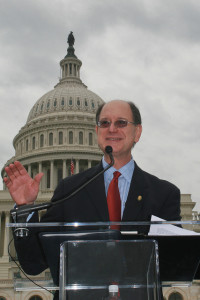
Rep. Brad Sherman (D-CA)
Last Tuesday night, Representative Brad Sherman, Democrat from California’s 30th Congressional District north of Los Angeles, held a town hall meeting by telephone. Taking questions from constituents, Sherman explained his positions on a number of hot issues, including the Trans-Pacific Partnership (TPP), climate change, Net Neutrality and California’s historic drought. Sherman also appeared on the RT network on Tuesday to talk about the TPP. Join us for a recap of these events after the jump:
Trans-Pacific Partnership (TPP) — Representative Sherman is the ranking Democrat on the House Asia Subcommittee, as well as being the second ranking Democrat on the House Foreign Affairs Committee and senior member of the House Financial Services Committee. Thus, Sherman is deeply involved in the issue of the TPP. Sherman stated that he opposes the TPP for several reasons. First, Sherman said that China would benefit indirectly from the TPP (for example, by manufacturing goods part way, selling them to Vietnam, and then having Vietnam sell them to the United States duty free, while China, which isn’t a signatory to the TPP, isn’t required to open its markets in return). Second, Sherman said that the TPP offers no protection against currency manipulation by other countries, which costs many U.S. jobs. Sherman said he wants “fair trade” throughout the world. Third, according to Sherman, powerful corporate interests favor the TPP, in order to make more money manufacturing goods abroad and selling them back to the USA. Fourth, Sherman said that TPP-type deals also lead to plant closures and lower wages in America, as the fewer plants that remain here can keep wages down because there are more workers competing for fewer jobs.
Climate Change — Congressman Sherman believes that climate change is having devastating effects, and he favors the development of renewable energy for both environmental and economic reasons. Sherman said that newly constructed homes and commercial buildings should be built to meet the highest energy efficiency standards and should be wired for future renewable energy uses, such as charging stations for cars, as well as solar panels.
Net Neutrality — Sherman said that he favors Net Neutrality. He said that Internet users should not forcibly be steered to a particular service or content provider by means of speed differentials or otherwise. Rep. Sherman did, however, make clear that Net Neutrality does not mean that everyone should pay the same rate for Internet service. For example, if some users want faster speeds and/or use more bandwidth, they should pay more than other users, like Sherman’s own mother, who he said may not care about speed and who primarily use the Internet for email rather than video, etc.
California Drought — One caller asked Representative Sherman whether the Los Angeles County area should use more water desalinization plants, as neighboring Ventura County reportedly does. Sherman said that desalinization is very expensive, not profitable for many crops, and also adds to the carbon footprint that causes global warming. Sherman stated that California residents only use one-fourth the amount of water that California farms are using, thus there needs to be a focus on agricultural water use. In particular, Sherman said he would like to protect “high value, high jobs crops,” prioritizing such crops over things like hay exports to China.
Corporate Taxes and Job Offshoring — Congressman Sherman said he favors international taxation to eliminate tax havens like the Cayman Islands, where U.S. companies often have no presence except for a post office box. Sherman said such taxation should be apportioned based on where companies produce and sell their goods. Sherman also suggested that American corporations be taxed on their worldwide income, and that if U.S. corporations change their country of domicile, they should be immediately taxed on all unrealized corporate gains. Sherman said that such proposals would, if implemented, stop many U.S. companies from leaving the U.S. for tax advantages. Sherman recognized, however, that powerful multinational corporations obviously oppose such proposals.
U.S.-Iran Nuclear Deal — Representative Sherman took a bit of a dual position on the current negotiations between the United States and Iran over Iran’s nuclear program. Sherman said that the U.S. did not act on the Iran nuclear issue for many years, until 2012, and that Iran’s nuclear weapons program is the single greatest threat to the U.S. Sherman thinks that the current deal between the U.S. and Iran is a bad one, primarily because it essentially would end in nine and a half years, after which Iran would then be free once again to continue its nuclear weapons program. However, Congressman Sherman said that Iran is just months away from developing nuclear weapons now, thus further economic sanctions on Iran at this point would be ineffective. Accordingly, Sherman said that Congress should not support the U.S.-Iran deal, but it should not sabotage the deal either. Presumably, this means that Sherman would passively allow the deal to take effect, and that America would have to revisit the situation when the term of the deal is close to ending.
Photo by Cliff, used under Creative Commons license. http://is.gd/QxPyqH


